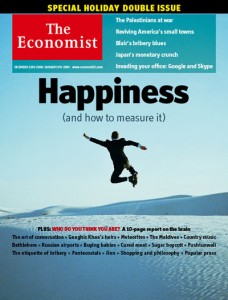 Bob Garfield of NPR’s “On The Media” interviews media superblogger Jeff Jarvis and asks “Can journalism be sustained in the top 25 markets if all the dailies fold?
Bob Garfield of NPR’s “On The Media” interviews media superblogger Jeff Jarvis and asks “Can journalism be sustained in the top 25 markets if all the dailies fold?
The question was prompted by a recent project by the City University of New York Graduate School Of Journalism that created economic models for next-generation news organizations. Jarvis says a decentralized, hyperlocal newsgathering infrastructure is not only plausible but quite profitable. Some hyperlocal bloggers are already pulling in up to $200,000 annually in revenue, he says, and that’s without the sophisticated funding and advertising mechanisms that are now being developed. We’d like to talk to one of these people.
The metropolitan news organization of the future will be smaller but no less profitable than that of today, Jarvis predicts. His study foresees a full-time staff of about 45 people with substantial contributions from locals. “It needs to work more collaboratively with bloggers and other locals,” he says. All together, a next-generation metro newsroom could have about 275 regular contributors.
“At the end of three years, our research shows that these businesses bring in margins that are reminiscent of the glory days of newspapers,” Jarvis states. “However, they’re much smaller businesses. A 20% margin on a $30 million business is not the same as on a $400 million business. But it is profitable, and that means it’s sustainable.”
Ever the optimist, Jarvis further states that journalism can become “better and richer” in the new model, Although there’s going to be some chaos in the process, “I believe we can actually improve journalism, not just save it,” he says.
They won’t be doing either in Loudoun, Va. The Washington Post Co. is closing its experimental hyperlocal site, the LoudounExtra, after two years, saying that the business “was not a sustainable model.” There were extenuating factors, however. The executives who launched the site left soon after startup and LoudounExtra never received the appropriate attention from the struggling parent company. One of those execs Rob Curley, moved on to bigger and better things in Las Vegas.
Miscellany
The Chicago Sun-Times Media Group (STMG) may be a few weeks from insolvency. The owner of the Sun-Times newspaper has just $19.3 million in cash left and is burning nearly $1 million per week, according to court documents. Chairman Jeremy Halbreich said he has been talking with several potential buyers who are more focused on cost structure than cash on hand. STMG has been in Chapter 11 bankruptcy since March 31. If it runs out of money, it would probably have to abruptly shut down without offering severance or other transitional amenities.
The Red Wing (Minn.) Republican Eagle will cut back from five days to two days a week. “Goodhue County’s No. 1 news Web site” will continue to be updated daily. The paper said the cutbacks were being made in order to save money and to focus reporting on its local market.
In the economically devastated region of South Florida, the 55-year-old Boca Raton News published its last print edition yesterday. The paper had previously cut back from five days per week to three. No employees will be laid off, but the paper’s offices will be closed and everyone will work from home. Perhaps this is precisely what Jeff Jarvis has in mind.
“The New York Times is quietly seeking a buyer for its Santa Rosa (Calif.) Press Democrat,” said the anonymous message that landed in our inbox. Now you know as much as we do.
And finally…
As we enter the last two weeks of summer and news all but grinds to a halt, bloggers are turning to the offbeat and bizarre. Former Baltimore Sun copy chief John McIntyre reviews a third and expanded edition of “The F Word“ (Oxford University Press, 270 pages, $11.53 on Amazon), a book that is all about, well, the “F word.” Author Jesse Sheidlower apparently scoured 500 years of English literature to trace the evolution of everyone’s favorite expletive from its mid-15th century origins on the European continent to Jon Stewart on The Daily Show. In the course of his research, Mr. Sheidlower “read an astonishing amount of Victorian pornography,” McIntyre concludes. We can’t wait till Google gets around to putting it all on line.
We’ve been reading with some dismay recently that the US no longer ranks in the top 25 countries on high school achievement test scores. We don’t want to believe that, but then we see videos like this monologue by a resident of Santa Cruz, Calif. testifying before the city Council last year about, we think, vegetables. It speaks for itself. (Via Free From Editors.)








 Circulation at the Los Angeles Times passed one million in 1961. Last month it passed one million again –
Circulation at the Los Angeles Times passed one million in 1961. Last month it passed one million again –  Magazine publishers might want to catch the next flight to London to find out what the heck they’re doing right at The Economist Group.
Magazine publishers might want to catch the next flight to London to find out what the heck they’re doing right at The Economist Group. 

 If the new owners of the San Diego Union-Tribune are planning to reinvent the news operation, they made a surprising choice in
If the new owners of the San Diego Union-Tribune are planning to reinvent the news operation, they made a surprising choice in  If the past is any clue to the future, then the New York newspaper strike of 1962-63 may offer a glimpse of what a nation without daily newspapers would look like. Slate’s Jack Shafer has a wonderful account of what a news-starved city did when
If the past is any clue to the future, then the New York newspaper strike of 1962-63 may offer a glimpse of what a nation without daily newspapers would look like. Slate’s Jack Shafer has a wonderful account of what a news-starved city did when 


